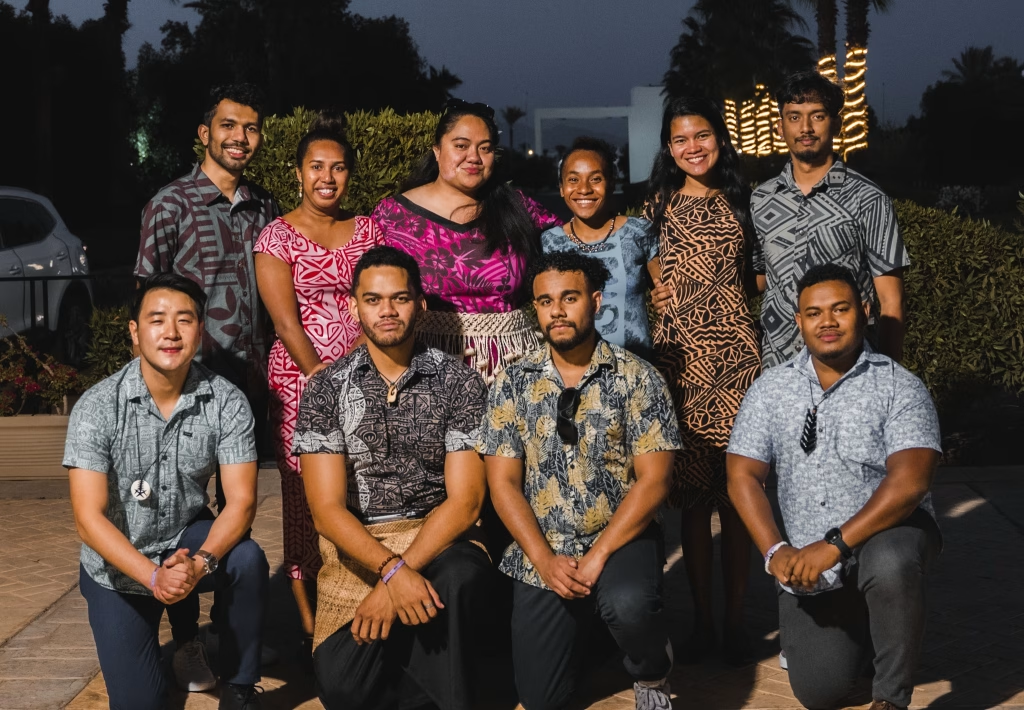On Assignment for People and the Planet
HELEN WALNE
"You don’t need to make a change in the world at the completion of your studies. You can spark a change at any time of your life."
As our planet heads towards an uncertain future, many of us are feeling frozen. ‘What can we do?’ is a common refrain. ‘How can I, just a normal person with no connection to politicians, or business leaders, or billionaires, make a difference?’
A group of undergraduate students have shown us how.
Sepasitiano Patelisio is far from home. When we talk via Zoom about the ocean, he gestures towards the window of his apartment in Bristol, in England, and laughs: ‘The sea is out there somewhere’. However, while his studies require him to be in the UK, where he is completing a master’s degree in International Law & International Relations, Sepasitiano carries the ocean and his home inside him. For the past six years, this has been his focus.
As vice-president of Pacific Islands Students Fighting Climate Change (PISFCC), he and his colleagues recently made history – they were the driving force behind the International Court of Justice’s advisory opinion that a healthy planet is a human right.
That victorious day in The Hague was preceded by years of persistence, lobbying, and preparation – and all by a group of students no older than 25. It all started with an assignment question: What would be the most effective way to address climate change? After debate and discussion, Sepasitiano says the students – all studying at the University of the South Pacific – arrived at an answer: ‘To take the world’s largest problem to the world’s highest court.’
After the assignment was handed in, a spark was ignited. What if the idea could become reality? What if all the research and thinking that went into the assignment could be collated and used in an actual case at the actual ICJ?
‘We didn’t just want this idea to fade away once classes were done. We wanted to turn it into a reality; a global movement,’ says Sepasitiano.

Their first challenge was trying to convince their own government on the island of Vanuata to support their campaign. Their letter found its way into the right hands: the then minister of foreign affairs, Honourable Ralph Regenvanu, who said he would support the group. Notably, the minister now oversees the government’s climate change department.
The next step was to get the backing of every Pacific Island government. Again, another serendipitous moment helped to progress the campaign – a Pacific Islands forum, held in Fiji in 2019, where heads of government come together to discuss pressing issues. The students pounced. ‘With Vanuatu already having our back, we had two of our members flown into the meeting to present our idea. When you seek the help of a government, you don’t just go empty handed. We had to go well researched, with researched arguments and documents. Our lecturers were very much the backbone of this campaign. They helped us provide a clear pathway on how each step would be achieved,’ says Sepasitiano.
Once our idea was introduced, we got the news that most of the Pacific Island ‘governments supported our campaign. So that’s how this classroom idea turned into a reality.’
On July 23, four PISFCC members presented the case at the ICJ in The Hague. ‘I watched it online from Bristol. That thing was very emotional,’ says Sepasitiano. When the advisory opinion was delivered later that afternoon, ‘everyone was in tears, everyone was just crying’.
"We didn’t just want this idea to fade away once classes were done. We wanted to turn it into a reality; a global movement."
The court’s opinion was groundbreaking, affirming that nations can be held legally accountable for their greenhouse gas emissions, and that a healthy environment is a human right. As inhabitants of islands most at risk of submersion due to human-induced sea-level rise, the students and their communities were further emboldened. And the world was inspired.
‘You don’t need to make a change in the world at the completion of your studies. You can spark a change at any time of your life, and this campaign really showed how these law students were able to achieve this,’ says Sepasitiano.
Two driving forces kept the students going: urgency and solidarity.
‘The urgency is to protect our islands from sinking and protect them for the betterment of future generations. We would want an environment that is healthy. We would want an environment that is full of life, not just for ourselves, but for future generations,’ says Sepasitiano, pointing to the real threat of rising seas, and the increasing frequency of cyclones and droughts. ‘It’s a matter of life and death.’
Solidarity was found in co-operation between each of PISFCC’s four chapters (Solomon Islands, Fiji, Micronesia, and Tonga) and civil society and non-governmental organisations in their regions. ‘Each government with their endorsement, and each petition signed, gave us the energy to keep going.’
However, most important was the belief that they could not let other people determine their future. ‘We can’t just sit back and let the elders do the work. We also have a voice in determining our future, as well as the future of those to come. And we can’t just say, “Isn’t this the responsibility of the government?” We all have a role to play.’
As the students now unpack the advisory opinion and identify ways to influence policy and advance the ICJ’s recommendations, their persistence, ambition and grassroots mobilisation serves as an incredible demonstration of civic agency and intergenerational responsibility. Their refusal to be passive recipients of inherited systems that are failing people and the planet is an inspiring source of comfort. It might not be an advisory opinion at the ICJ, but we can all achieve something if we join forces and raise our voices.